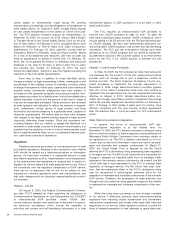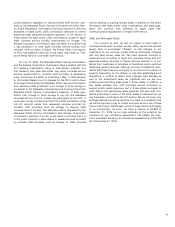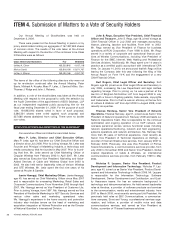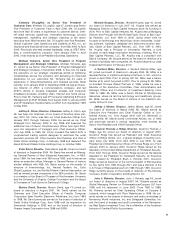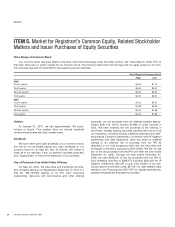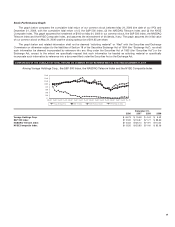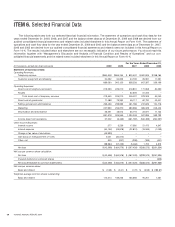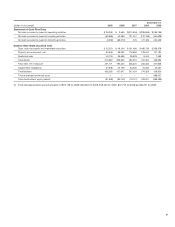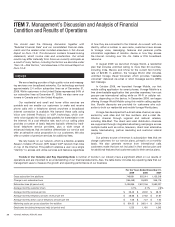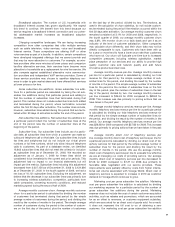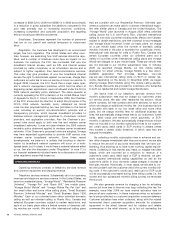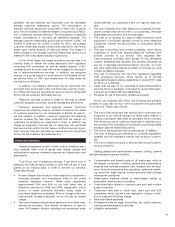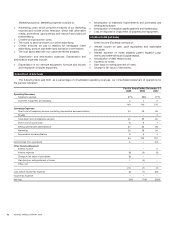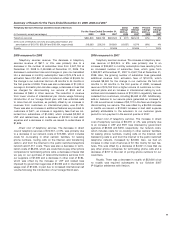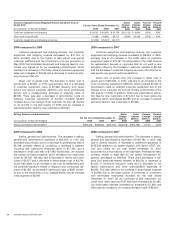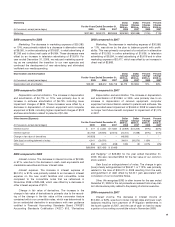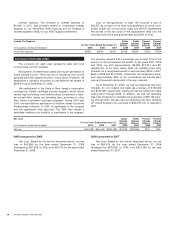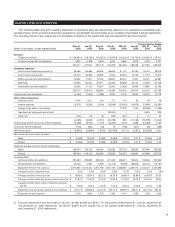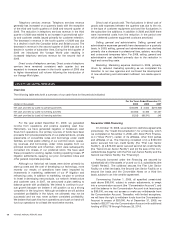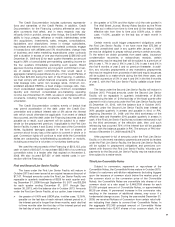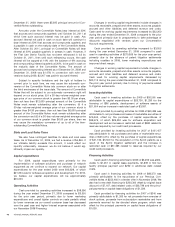Vonage 2009 Annual Report Download - page 38
Download and view the complete annual report
Please find page 38 of the 2009 Vonage annual report below. You can navigate through the pages in the report by either clicking on the pages listed below, or by using the keyword search tool below to find specific information within the annual report.
increased to $304.52 for 2009 from $266.14 in 2008 due primarily
to a reduction in gross subscriber line additions compared to the
prior year primarily due to worsening economic conditions,
increasing competition and customer acquisition and targeting
efforts not being as effective as planned.
Employees. Employees represent the number of personnel
that are on our payroll and exclude temporary or outsourced
labor.
Regulation. Our business has developed in an environment
largely free from regulation. The United States and other coun-
tries, however, are examining how VoIP services should be regu-
lated, and a number of initiatives could have an impact on our
business. For example, the FCC has concluded that wire line
broadband Internet access, such as DSL and Internet access
provided by cable companies, is an information service and is
subject to lighter regulation than telecommunications services.
This order may give providers of wire line broadband Internet
access the right to discriminate against our services, charge their
customers an extra fee to use our service or block our service. In
August 2008, however, the FCC found that a major cable oper-
ator’s network management practices, which had the effect of
degrading certain applications, were not allowed under the FCC’s
2005 network neutrality policy statement. The cable operator is
currently appealing the FCC’s decision in the United States Court
of Appeals for the D.C. Circuit. In September 2009, the Chairman
of the FCC announced his intention to adopt the principles in the
FCC’s 2005 network neutrality policy statement as formal
rules. He also proposed adding two new principles to the formal
rules, including an explicit non-discrimination principle and a
transparency principle, which requires broadband providers to
disclose network management practices to consumers, content
providers, and application providers. Also the Chairman’s pro-
posed rules would apply to both wire line and wireless carrier
broadband networks. It was not clear whether the 2005 network
neutrality policy statement applied to wireless carrier broadband
networks. If the Chairman’s proposed rules are adopted, Vonage
may have expanded opportunities to provide VoIP service over
wireless carrier broadband networks. Given these recent
developments, we believe it is unlikely that blocking or discrim-
ination by broadband network operators will occur on a wide-
spread basis, but if it does, it would have a material adverse effect
on us. See also the discussion under “Regulation” in note 11 to
our financial statements included herein for a discussion of certain
other regulatory issues that impact us.
OPERATING REVENUES
Operating revenues consists of telephony services revenue
and customer equipment and shipping revenue.
Telephony services revenue. Substantially all of our operating
revenues are telephony services revenue. In the United States, we
have four residential plans, “Vonage World”, “Residential Premium
Unlimited”, “Vonage Pro” and “Basic 500,” two mobile plans,
“Vonage World Mobile” and “Vonage Mobile Pay Per Use” and
two small office and home office calling plans, “Small Business
Premium Unlimited Minutes” and “Small Business Basic 1500
Minutes.” Each of our unlimited plans offers unlimited domestic
calling as well as unlimited calling to Puerto Rico, Canada and
selected European countries, subject to certain restrictions, and
each of our basic plans offers a limited number of domestic call-
ing minutes per month. We also offer international calling plans
that are bundled with our Residential Premium Unlimited plan
where a customer can make calls to a chosen international region.
We offer similar plans in Canada and the United Kingdom. The
“Vonage World” plan launched in August 2009 offers unlimited
calling across the U.S. and Puerto Rico, unlimited international
calling to over sixty countries including India, Mexico and Canada,
subject to certain restrictions, and free voicemail to text messages
with Vonage Visual Voicemail. Under our basic plans, we charge
on a per minute basis when the number of domestic calling
minutes included in the plan is exceeded for a particular month.
International calls (except for calls to Puerto Rico, Canada and
certain European countries under our unlimited plans and a
variety of countries under international calling plans and Vonage
World) are charged on a per minute basis. These per minute fees
are not included in our monthly subscription fees. In October
2009, we launched Vonage Mobile, our first mobile calling
application for smart phones. Vonage Mobile is a free down-
loadable application that provides seamless, low-cost
pay-per-use international calling while on Wi-Fi or cellular net-
works, depending on the device. In December 2009, we began
offering Vonage World Mobile using this mobile calling applica-
tion. Bundle discounts are provided for customers who subscribe
to both our residential and mobile Vonage World plans.
We derive most of our telephony services revenue from
monthly subscription fees that we charge our customers under
our service plans. We also offer residential fax service, virtual
phone numbers, toll free numbers and other services, for each of
which we charge an additional monthly fee. One business fax line
is included with each of our two small office and home office
plans, but we charge monthly fees for additional business fax
lines. We automatically charge these fees to our customers’ credit
cards, debit cards and electronic check payments, or ECP,
monthly in advance. We also automatically charge the per minute
fees not included in our monthly subscription fees to our custom-
ers’ credit cards, debit cards or ECP monthly in arrears unless
they exceed a certain dollar threshold, in which case they are
charged immediately.
By collecting monthly subscription fees in advance and cer-
tain other charges immediately after they are incurred, we are able
to reduce the amount of accounts receivable that we have out-
standing, thus allowing us to have lower working capital require-
ments. Collecting in this manner also helps us mitigate bad debt
losses, which are recorded as a reduction to revenue. If a
customer’s credit card, debit card or ECP is declined, we gen-
erally suspend international calling capabilities as well as the
customer’s ability to incur domestic usage charges in excess of
their plan minutes. Historically, in most cases, we are able to cor-
rect the problem with the customer within the current monthly bill-
ing cycle. If the customer’s credit card, debit card or ECP could
not be successfully processed during three billing cycles (i.e. the
current and two subsequent monthly billing cycles), we terminate
the account.
We also generate revenue by charging a fee for activating
service but from time to time we may forgo collecting this fee. For
example, since May 2009 we have waived activation fees for
almost all new customers. In these instances when no activation
fee is being collected, no customer acquisition costs are deferred.
Customer activation fees when collected, along with the related
incremental direct customer acquisition amounts for customer
equipment in the direct channel and for rebates and retailer
commissions in the retail channel, up to but not exceeding the
30 VONAGE ANNUAL REPORT 2009


